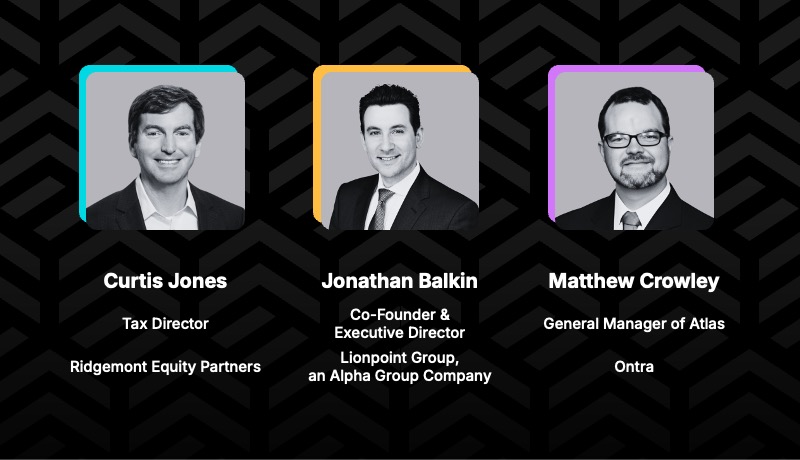The Financial Crimes Enforcement Network (FinCEN) implemented reporting requirements under the Corporate Transparency Act (CTA) on September 30, 2022 (“Final Rule”).
Since then, private capital market firms have been assessing the new requirements, their legal entities, and their entity management processes. Right now, many firms are relying heavily on decentralized information and manual processes, leading to an overly burdensome CTA assessment. As a result, firms are realizing they can greatly benefit from a centralized entity management solution.
Atlas is Ontra’s AI-powered entity management for private equity. It digitizes entity management and automates compliance tasks to help firms decrease costs and improve collaboration. With Atlas, private markets firms can:
- Manage beneficial ownership information (BOI) for all entities in one AI-enabled platform
- Designate which entities require CTA filings and which are exempt
- Quickly reference key identity details required for BOI reporting
- Make updates to beneficial ownership information that automatically apply across entities and structures
- Automate FinCEN filing for non-CTA-exempt entities
Let’s take a closer look at the latest CTA updates and how Atlas supports CTA compliance with automated BOI filings.
FinCEN is now accepting BOI reports
FinCEN began accepting BOI reports on January 1, 2024.
Businesses must report:
- The full legal name of the reporting company
- All trade names, fictitious names, or names the company is doing business under, regardless of whether the name is registered
- The street address of the company’s principal place of business
- The state or tribal jurisdiction of formation
- The IRS taxpayer identification number
For each beneficial owner or company applicant, businesses must report:
- Their full legal name
- Their date of birth
- Their current residential or business street address
- A unique identifying number from an acceptable identification document and a legible image of the identification document corresponding to the unique identifying number
Compliance deadlines for BOI reporting
BOI reporting is a one-time requirement unless the filing company needs to update or correct information.
Existing entities: Businesses have until January 1, 2025, to file BOI reports for reporting companies that existed or were registered in the U.S. before January 1, 2024.
New entities: Businesses have 90 calendar days after receiving actual or public notice that your entity registration or creation was effective to file a BOI report with FinCEN.
BOI reporting requirements and exemptions
The Final Rule requires all U.S. domestic and certain non-U.S. legal entities to disclose information about themselves, their beneficial owners (including persons who exercise substantial control over the company), and up to two company applicants unless an entity falls under an exemption.
The Final Rule exempts 23 types of entities from BOI reporting:
- Securities reporting issuer
- Governmental authority
- Bank
- Credit union
- Depository institution holding company
- Money services business
- Broker or dealer in securities
- Securities exchange or clearing agency
- Other Exchange Act registered entity
- Investment company or investment adviser
- Venture capital fund adviser
- Insurance company
- State-licensed insurance producer
- Commodity Exchange Act registered entity
- Accounting firm
- Public utility
- Financial market utility
- Pooled investment vehicle
- Tax-exempt entity
- Entity assisting a tax-exempt entity
- Large operating company
- Subsidiary of certain exempt entities
- Inactive entity
FinCEN updated its frequently asked questions about BOI
FinCEN added or updated numerous BOI FAQs in April 2024. Here are the latest additions:
Reporting Company
C.8. Do the BOI reporting requirements apply to S-Corporations?
C.9. If a domestic corporation or limited liability company is not created by the filing of a document with a secretary of state or similar office, is it a reporting company?
C.10. Are homeowners associations reporting companies?
Beneficial Owner
D.13. Who is the beneficial owner of a homeowners association?
D.14. Can beneficial owners own or control reporting companies through trusts?
D.15. Who are a reporting company’s beneficial owners when individuals own or control the company through a trust?
D.16. How does a reporting company report a corporate trustee as a beneficial owner?
Reporting Requirements
F.12. What address should a reporting company report if it lacks a principal place of business in the United States?
Initial Report
G. 6. A company that was created or registered before January 1, 2024, and was exempt from the BOI reporting requirements loses its exempt status between January 1, 2024, and January 1, 2025. How long does the reporting company have to file its initial BOI report?
Reporting Company Exemptions
L. 7. If the size of a reporting company fluctuates above and below one of the thresholds for the large operating company exemption, does the reporting company need to file a BOI report?
Access to Beneficial Ownership Information
O.1. When will authorized recipients have access to beneficial ownership information?
O.2. I work at a Federal agency. How can I request beneficial ownership information from FinCEN?
O.3. Which state agencies can request beneficial ownership information from FinCEN?
O.4. Can foreign governments access beneficial ownership information?
O.5. How should authorized recipients prepare to receive, store, and use beneficial ownership information?
O.6. Although financial institutions subject to customer due diligence requirements are not currently required to access the beneficial ownership IT (BO IT) system, what are the current supervisory expectations if they choose to access beneficial ownership information from the BO IT system, when access becomes available to them?
Download FinCEN’s FAQs for more information.
CTA litigation update
Holland & Knight provides a thorough overview of the ongoing CTA litigation.* In National Small Business United v. Yellen, a federal district court in the Northern District of Alabama found the CTA to be unconstitutional because it exceeds the Constitution’s limits on Congress’ powers. The court rejected the government’s arguments that the BOI Reporting Rule was constitutionally based on Congress’ powers to oversee foreign affairs and national security, regulate interstate commerce, and impose taxes and related regulations. The court enjoined FinCEN from enforcing the CTA against the plaintiffs.
The government appealed, and on April 15, 2024, the DOJ filed two briefs:
- One with the Eleventh Circuit, asserting the CTA is constitutional in its appeal of the National Small Business United decision
- One with the U.S. District Court for the Western District of Michigan, responding to the plaintiff’s arguments in Small Business Association of Michigan v. Yellen.
Three amicus briefs recommending that the court reverse the decision in the National Small Business United case were also filed in April.
Automate CTA compliance with Atlas
The 2023 launch of Atlas could not have come at a better time. Scattered entity information slows down firms and increases their teams’ workloads. Implementing Atlas to centralize and digitize entity information is key to accelerating BOI reporting and streamlining other repetitive entity management tasks.
Atlas now enables firms to automate BOI report filings with a single click.
Atlas uses AI-enabled automated workflows to organize, manage, and share entity data, structure charts, and legal documents, creating a digital single source of truth. Schedule an Atlas demo today if you’re ready to take advantage of an AI-enabled solution that delivers up-to-date BOI information and automated CTA filings.
*The organizations referenced in this article have no affiliation with Ontra, and neither Ontra nor such organizations promote or endorse the other’s products or services.




